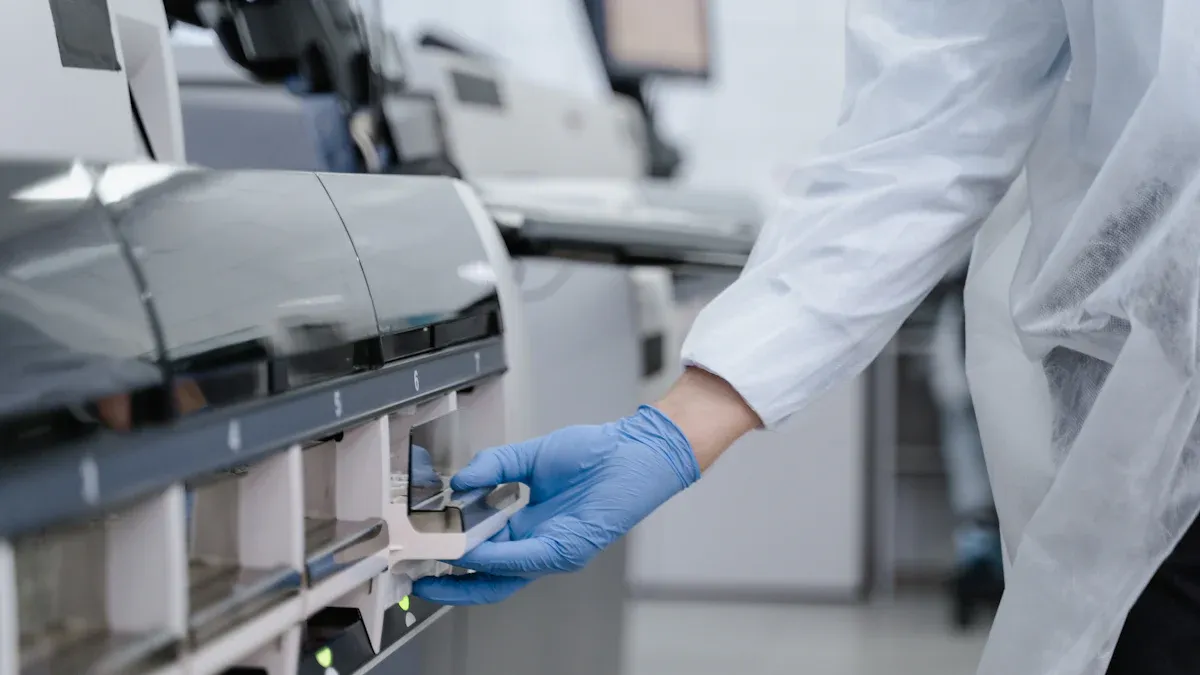Comprehensive Guide to Finding TÜV-Certified Medical-Grade Nitinol Tubing in Germany 2025

Finding trusted suppliers for medical grade nitinol tubing in Germany TUV certified requires careful planning. Visit TÜV's official site to verify certifications and ensure compliance. Explore industry directories to identify experienced providers of medical materials. Trade associations also offer lists of reliable suppliers. Leveraging these resources streamlines your search and ensures adherence to strict quality standards.
Key Takeaways
Use TÜV's official database to find certified suppliers. This tool checks certifications and ensures safety rules are followed.
Look at industry directories to find trusted suppliers. These lists show companies that follow strict global rules.
Ask trade groups for advice and recommendations. They can link you to TÜV-certified companies and share helpful tips.
Go to trade shows and conferences to meet experts. These events help you learn new things and find good suppliers.
Always check TÜV certification and quality before picking a supplier. This makes sure the materials are safe for medical use.
Understanding TÜV Certification

What is TÜV Certification?
TÜV certification shows that products are safe and high-quality. It checks if items, services, or processes follow strict global rules. TÜV doesn’t make these rules but tests them using standards like ISO and IEC.
TÜV certification follows these steps:
Set rules based on the product's needs.
Pick experts to manage the testing process.
Create tests that match the rules.
Perform tests with TÜV watching.
Give certification after passing all tests.
For instance, TÜV Rheinland certified BlackBerry QNX® OS for Safety to meet ISO 26262 ASIL D and IEC 62304 Class C. This proves it meets tough safety and quality rules.
Why TÜV Certification Matters for Medical Materials
TÜV certification ensures medical materials are safe and high-quality. It confirms they follow EU rules like MDR and IVDR.
Benefit/Statistic | Description |
|---|---|
Trusted Worldwide | TÜV Rheinland is respected globally for its certifications. |
Fewer Problems | Expert help reduces mistakes and product issues. |
Reliable Products | Certification ensures items are safe and work well. |
Quick Checks | TÜV audits are fast and efficient. |
Many Services | TÜV offers many types of certifications. |
EU Rule Compliance | Meets EU rules for medical devices and diagnostics. |
Picking TÜV-certified suppliers lowers risks and ensures top-quality materials. This certification proves your nitinol tubing is safe and follows strict rules.
Finding Medical Grade Nitinol Tubing Germany TÜV Certified Suppliers
Using TÜV's Official Database
Start by checking TÜV's official database to find certified suppliers. This tool helps confirm certifications and ensures strict rules are followed. You can search for suppliers by entering details like material type or needed certifications.
The database is easy to use and gives clear supplier details. It shows their certification status, services offered, and contact information. Using this tool helps you quickly find suppliers who meet TÜV's high standards. This ensures the tubing you choose follows CE rules and meets top safety and quality levels.
Tip: Save the TÜV database link for later use. Checking it often keeps you updated on certified suppliers and any changes in their status.
Exploring Industry Directories
Industry directories are also helpful for finding TÜV-certified suppliers of medical nitinol tubing. These directories list companies that focus on medical materials and often include TÜV-approved ones. Look for directories related to medical devices or materials engineering.
These directories follow strict global rules like ISO 17029, which ensures they are accurate and fair. For example:
Standard | Description |
|---|---|
ISO 17029 | Ensures validation bodies are skilled, fair, and consistent. |
ISO 14064-3 | Gives rules for measuring and reporting greenhouse gas emissions. |
Some directories are even audited to keep their data reliable. For instance, TÜV SÜD confirmed CleanHub's accuracy and fairness in operations. This ensures listed suppliers are trustworthy and meet high standards.
Note: Always double-check directory information with TÜV's database to confirm certifications.
Contacting Trade Associations
Trade associations can connect you with trusted suppliers. They often have networks of TÜV-certified companies and can give tailored advice. In Germany, groups like BVMed or EAMDS are great places to start.
Ask these associations for lists of suppliers who specialize in medical nitinol tubing. Many also host events and webinars where you can meet experts and learn about new materials.
Tip: When reaching out, share your needs, like CE compliance or TÜV certification. This helps them give better recommendations.
By using TÜV's database, directories, and trade associations, you can easily find certified suppliers. Companies like AccuPath, known for quality nitinol tubing, are often highlighted. Their focus on precision and rules makes them a reliable choice for medical materials.
Networking at Trade Shows and Conferences
Going to trade shows and conferences helps you meet important people. These events gather experts from the medical materials field. You can learn about new trends, tools, and ideas for medical-grade nitinol tubing.
Talking to others at these events helps build strong connections. Surveys show attendees like meeting partners face-to-face. Many say these meetings lead to better supplier relationships. For example, in-person talks often create partnerships that online chats cannot.
Event organizers ask for feedback to improve future shows. This makes it easier to find suppliers with TÜV certification and CE compliance. By attending, you can benefit from these changes and find trusted suppliers.
To get the most out of it, plan ahead. Check the event schedule and find exhibitors who focus on medical materials. Write down questions about certifications, production, and quality. Being prepared helps you use your time wisely and make good connections.
Tip: Bring business cards and a short summary of your needs. This helps exhibitors remember you and follow up later.
Trade shows also offer classes and workshops. Experts often talk about rules like TÜV certification for medical tubing. These sessions teach you about industry standards and help you pick the best suppliers.
By using trade shows and conferences, you can find reliable suppliers. This saves time and ensures you get safe, high-quality materials.
Evaluating Suppliers
Verifying TÜV Certification
Checking TÜV certification is key when choosing suppliers. It proves their products and processes meet strict safety and quality rules. Follow these steps to check certifications:
Look at their processes: Study how the supplier works. Talk to their staff and review their documents.
Do an audit: Make sure their work matches their documents and works well.
Ask for improvements: Suggest ways they can do things better.
Check regularly: Ensure they have yearly reviews to stay compliant.
These steps help you find suppliers who follow TÜV standards. For example, TÜV-certified suppliers are great at testing medical devices. They meet CE rules and pass biocompatibility tests. This ensures the medical-grade nitinol tubing you buy meets ISO 10993 standards and is safe for medical use.
Tip: Always ask suppliers for their TÜV certification papers. Double-check this with the official TÜV database to make sure it’s real.
Assessing Quality Standards and Capabilities
Checking a supplier’s quality and skills ensures they can provide good materials for medical use. Trustworthy suppliers follow clear rules and have proof of their quality. Look for these certifications:
ISO 13485: Shows they have a system for making safe medical devices.
ISO 9001: Focuses on improving quality and keeping customers happy.
FDA Rules (21 CFR Part 820): Ensures they follow U.S. medical device standards.
MDR and IVDR: Requires suppliers to meet EU medical device rules.
Some rules, like MDR Article 10 (9) d and ISO 13485:2016, say manufacturers must check their suppliers. This ensures the supply chain stays high-quality. Suppliers with these certifications can handle medical-grade nitinol tubing and meet ISO 10993 biocompatibility standards.
Note: Ask suppliers for proof of their certifications and quality checks. This helps confirm they meet the tough rules of the medical device industry.
By checking TÜV certification and quality standards, you can pick suppliers who provide safe, reliable materials. This protects your work and ensures you meet CE and medical device rules.
Finding TÜV-certified suppliers for medical-grade nitinol tubing in Germany is simple with the right methods. Use TÜV's database to check certifications. Look through industry directories to find skilled suppliers. Contact trade groups for personalized advice.
Tip: Check certifications twice and review supplier quality carefully. This helps meet medical rules and ensures safe materials.
Following these steps lets you pick suppliers with strict safety and quality. It saves time and keeps your projects at top standards.
FAQ
What is the MDR, and why does it matter for nitinol tubing?
The MDR stands for Medical Device Regulation. It makes sure medical devices are safe and high-quality in the EU. It protects patients by requiring careful testing and strict checks for materials like nitinol tubing.
How do you check if a supplier has TÜV certification?
Ask the supplier for their TÜV certification papers. Then, confirm the details using TÜV’s official database. This proves the supplier meets testing rules and follows MDR standards.
Why is testing important for medical nitinol tubing?
Testing shows the tubing is safe for medical use. It checks if the material is strong and works well with the body. Testing also ensures it meets MDR rules and avoids risks.
Can trade groups help find TÜV-certified suppliers?
Yes, trade groups often have lists of TÜV-certified suppliers. They can give advice and connect you with companies that make medical nitinol tubing.
What other certifications should you look for besides TÜV?
Look for ISO 13485, ISO 9001, and MDR approval. These certifications show the supplier follows strict rules and provides safe, high-quality materials.
See Also
The Manufacturing Process of Nitinol Tubing for Healthcare
The Importance of Nitinol Tubing in Modern Medicine
Nitinol Tubes: Shaping the Future of Medical Technology

